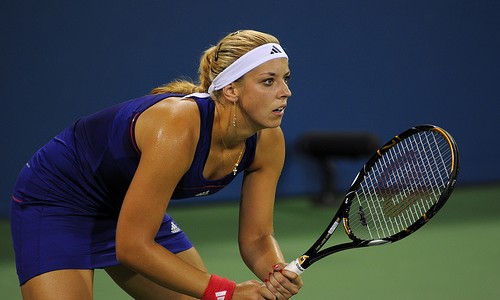Is tennis a battle of the mind?
Marion Bartoli dominated an overpowered Sabine Lisicki in straight sets 6-1 6-4 to claim her maiden Grand Slam win in a match which highlighted the importance of the mental side of the game.
While Bartoli thrived under the spotlight of the final Saturday at Centre Court, Lisicki crumbled and lost in a tame manner not befitting of her talent.
Lisicki herself acknowledged that she was ‘overwhelmed by the whole occasion’, even being reduced to tears after a particularly unfortunate double fault in the final set.
From the outset she looked nervous, seemingly losing countless points due to ugly mis-hits and scuffs. Despite a brave yet brief fight back in the second set, it ultimately represented too little too late.
It was depressing to watch a player who had thrilled the Wimbledon crowds over the last fortnight fall so painfully short due to the combination of fatigue and nerves.
While Lisicki appeared ravaged by tension, her quirky Frenchwoman opponent exuded intensity and concentration.
Between points she would scramble to the baseline, briefly perform a couple of ‘shadow’ strokes towards the linejudges before skipping forward once again to face the next point – almost in the style of a boxer between rounds, making her opponent perfectly aware that she was not letting up for a second.
It was clear that Bartoli had learnt from the mistakes of her previous final appearance, a straight sets defeat to an imperious Venus Williams, and was not going to let this opportunity pass.
Meanwhile, Lisicki soon became despondent, struggling to maintain her emotions as the Wimbledon crowd desperately attempted to encourage their favourite on.
It was depressing to watch a player who had thrilled the Wimbledon crowds over the last fortnight fall so painfully short due to the combination of fatigue and nerves
The long terms effects on each player’s careers will be intriguing. If Bartoli were to continue her form she showed at SW19, she will doubtless challenge for future titles.
However, one must wonder if this fortnight was merely a temporary surge in form aided by a relatively easy run which didn’t feature any of the top ten seeds, considering she had only reached a Grand Slam quarter final five times prior to this championships in a 14-year career.
The trajectory of Li Na does nonetheless act as an example for Bartoli to follow and possibly surpass.
Na was a late-bloomer who used the confidence gained from success at Roland Garros in 2011 at the age of 29 to firmly establish herself in the top ten of the world rankings.
What lies ahead for the charismatic Lisicki will also be absorbing to follow. The German is only 23 and thus cannot be considered to be at her peak yet, and her breathtaking performances against both Serena Williams and Agnieska Radwanska showcased her immense talent.
She certainly will not be short of support in future Wimbledon tournaments, having firmly established herself as a fan favourite through her impressive play and positive demeanour. However, one has to wonder how she will recover from such a damaging loss and whether she can ever develop the mental fortitude required to win a Grand Slam.
Dinara Safina is a prime example of someone who despite reaching the heights of a number one ranking, never managed to get herself over the final line of winning a Grand Slam – failing in straight sets in each of her three final appearances.
Overall, the women’s final highlighted just how challenging a experience a Grand Slam final can be not only physically, but also psychologically. Marion Bartoli learnt from the experience of a crushing Wimbledon final loss to Venus Williams in 2007; Sabine Lisicki will now hope she can do the same from her own straight-sets defeat.

Comments